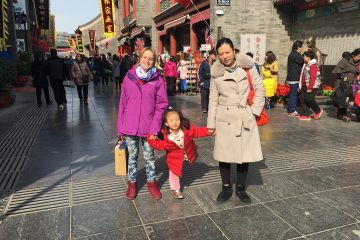Introduction
An active Taoist temple (the largest in Beijing), the White Cloud Temple is a peaceful retreat from busy city life – despite being just a short journey from the city centre. With over 1200 years of history (including several major renovations), you can admire the traditional architecture and soak up the atmosphere. The smell of incense permeates the air, and occasionally you will catch sight of small ceremonies, martial art exercises or religious chanting.
Don’t miss
Stone Memorial Gate
The entrance to the main temple courtyard area, the stone gate has three carved monkeys (believed to be the incarnation of a god) hidden on it or nearby – touch all three for good luck!
Wofeng Bridge
This stone bridge serves as the walkway into the temple. Of particular interest are the large copper coins hung on each side, each with a small bell in the centre. If you throw a coin an cause the bell to ring, taoists believe you’ll have a year of good fortune.
Ming Dynasty Statues
Within the main halls of the temple, large wooden statues from the Ming dynasty can be found. Of particular interest are the god Wang Lingguan (the guardian of Taoism) and the Jade Emperor.
Famine Bowl
Found in the Qiuzu Hall, this giant wooden bowl was said to be a gift from the Emperor Yongzheng, providing food in times of famine. The ashes of the first priest of the temple, Qiu Chuji, are buried under the bowl.
Yunji Garden
Located at the back of the temple, this small garden provides a peaceful retreat from the busy temple. It contains an alter and small hall, both sites of teaching and worship.
Qiu Chuji’s Birthday
Every year, on the 19th day of the first lunar month, a huge celebration takes place for the birthday of Qiu Chuji, the first priest of the temple and founder of the Longmen sect of Taoism. Come to enjoy the atmosphere and vibrance of the temple as it comes to life on this day – with chanting, singing and prayers.
Chinese Taoism Association
As the centre of Taoism in China, the White Cloud Temple is home to around 30 Taoism monks, who study and worship here while looking after the ancient buildings. You’ll spot them wearing blue gowns with their hair tied up in a bun – traditional Taoist attire.
Practical info
Tickets: 10 RMB (includes incense).
Opening hours: 8:30 – 16:30
Recommended visit: 1 hour.
Transport: take metro line 1 to Muxide station (木樨地), leave via exit C1 and continue straight on for 5 minutes to the crossroads. Turn right and walk for 15 minutes before turning left onto Baiyun Temple Road (白云观街). The temple is located a few minutes down on your left.
Top tip: this is an active temple, so be respectful – in particular, avoid overly revealing clothing and don’t take photos within the halls.
Nearby
Niujie Mosque 牛街礼拜寺



0 Comments